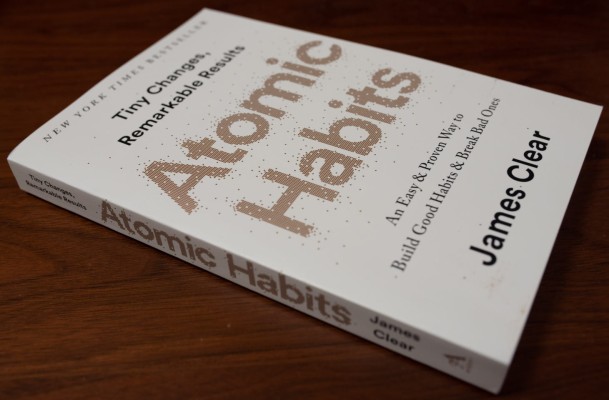My thoughts on Atomic Habits

Recently I really got into non-fiction books. I picked up a couple of productivity/self-help kind of books along the way. One is Atomic Habits by James Clear.
I won't go into a "full" book review, nor will I summarize the whole books. There's probably several websites which already have done so, so I'll keep this section short. I will split this article in half: First some initial thoughts on the book which stood out to me, and then how I implemented some ideas from the book into my daily life.
The book itself
Basically, the book is about habits and how tiny (good) habits have a positive compound influence on your life. The introduction tells you, that if an airplane is scheduled to fly from Los Angeles to New York, but has just a few degrees off, the outcome (destination) could easily become Washington, D.C.
The idea behind this anecdote is to highlight the compound effect of just flying the same off-angle for a long time.
Similarly, a small habit can have a great effect on your life. If you do just five minutes of excercise or language learning a day, it will have no (visible) effect on yourself within short time. But the compound effect of doing so over a year or longer will grow into a differnet lifestyle.
There's several psychological effects attached: many people quickly quit if trying to do daily >30 min. of excercise or >1h of language learning. It might be too time consuming, or the willingness to commit to it will quickly plummit. In contrast, a few minutes will still have an effect but are less of a burden. And likely the 5 minutes will increase over time anyway if the planned habit becomes part of you. So starting with just 5 minutes a day is an easy way for it to become part of you in the first place.
Another interesting anecdote was on the visibility of results after doing a habit. Imagine yourself in a fridge, trying to melt an ice-cube. If you start at -20 degree celcius, the ice-cube will be that, an ice-cube. Now consider that you put energy into it to increase its temperature day by day about one degree. It will still be an ice-cube by day 19 (i.e., it will still be -1 degree celcius), because the ice-cube has not reached its melting point yet. One day later, however, it will start melting and you can see the effect of your habit of increasing the temperature. This effect was delayed 20 days. It could have been easy to drop the habit in-between. However, if you do so, the temperature might decrease again and you end up with a -20 degree ice-cube again, having lost all your progress.
Habits like language learning are quite similar: You often see no effect of your studies for days after days. It's easily to think that you study has few or no effect on your language comprehension. With that you lose interest because you feel like no progress. But, it just takes time to reach the turning point. At some point you reach the languages' turning point and you can start speaking to natives. However, if you stop half way, you start to forget vocabulary and the progress is lost, similar to the ice-cube getting colder again.
The book will go into several strategies on how to build habits, and making them pleasing and satisfying. There's some psychology discussed behind how to do so, but it mostly dumbs down to making things easy: Making them visible, short, and quick to finish. There are also various hints on how to continue with habits after them being built (which mostly dumbs down to making them rewarding rather than punishing.)
Other than good habits, the book also discusses bad habits, like smoking, fast food, or reading too much social media. Mostly, all advice for "good" habits are inverted, switching "making them easy" to "making them hard". The book then discusses how to punish bad habits, getting them out of your eyes, and so on.
Thoughts on book
Overall, I liked the book. The book is a fun and very quick read. It's rather light-weight and all chapters start with some story or anecdote in order to prove a point.
It definitely changed my thinking in terms of how to approach habits. Especially the first half --to be honest, by the second half it gets a bit repetitive, because many things are re-phrasings of the initial set of ideas. Still, I had a great time reading it.
I actually plan to read it (or skim it) a second time in a few months. I think many ideas from the book need to be reflected on regularly, because its more a way to improve "way of thinking" towards habits or daily decisions.
How it changed my thinking
The first couple of chapters were eye-opening in a sense of how to treat habits: Some small compound investment to improve my future live rather than just a burden. It also gave me some insights on why some habits I targeted in the past just did not work, and it gave me some ideas on how to improve them.
One interesting idea on the way of thinking comes up early, where the book discusses thinking about lifestyles. Rather than thinking "I need to read more books" (which seems a burden/stress), the thinking should rather be "I am a reader (so naturally I'll read books when I have time for it)". Such small "hack" actually already made me reading more.
Next, making habits easier, I first looked at my environment: I've put things I want to do into my direct surroundings, like my books next to my bed and sofa. I've also put a language learning app in the center of my iPhone homescreen. I also removed some things from my environment to discourage bad habits: I deleted some unnecessary social media apps from my phone, and put necessary ones into folders or homescreen pages which I don't see so often.
I have further decreased the time I initially target for each habit. Rather than a stressfull "Learn French for 30 minutes per day", I now commit to doing so for 1 minute. If opening my French learning app, I usually still end up using it for 15-30 minutes, but the frequency of doing so greatly increased through this change.
Lastly, I have bought a habit tracking app for my phone (I went with Streaks for iOS) and set up several habits I want to work on:
- Drinking at least X cups of water per day
- No drinking coffee after 4pm
- Read one paper or listen one talk per day
- Touch source code of one of my projects once per day
- Learning French 1min per day
- Reading book 1min per day
- Write blog post weekly (Hey, I'm doing this right now)
- Do finances weekly
As you can see, most of them (especially the "Read/Touch/Do X once per day") are mostly setup in a way to force me starting something daily. As an outcome, I am much more productive because I end up doing most things much longer --mostly time, I would have often procrastinated reading news or social media instead.
I have trying to implement ideas of the book into my daily actions for the last two weeks and so far they have a very positive effect on my daily actions. Of course, it might slow down at some point, but so far so good.
Disclosure: This post may contain affiliate links. This means I may make a small commission if you make a purchase.
About me

Marc
I am a lecturer in field of computer science. I am interested in task- and knowledge management. Sometimes, I blog on productivity workflows, apps, and other related non-work stuff I'm working on.
See Also
More thoughts on streaks and gamification of habits
As I blogged recently I have been reading the book Atomic Habits and rethought some daily processes in terms of how I approach habits.
Read More...The Getting Things Done Book
The book Getting Things Done by David Allen can easily be seen as one of the bibles of personal productivity. It is a business book, …
Read More...